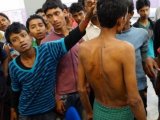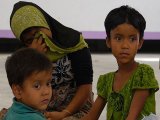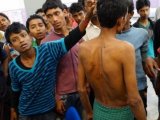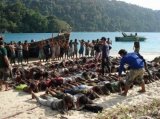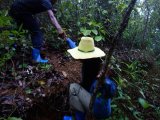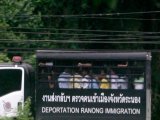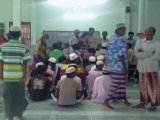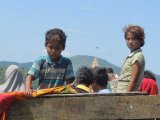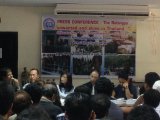PHUKET: A Rohingya boy who stayed for several months at a family shelter north of Phuket has been beaten to death by people smugglers in Malaysia, according to one of his former companions.
Amin, aged 17, had no family and no prospect of raising the money needed to free him from captivity, said 12-year-old Audul Hamit.
Audul now washes dishes for 10 hours for the equivalent of 50 baht a day and wishes he was back in the family shelter in Khao Lak, north of Phuket.
The two boys were enticed by a broker to flee the shelter on November 1, Audul said, hoping to find a better life in Malaysia. Amin was beaten to death while the two boys were at a camp in Malaysia, Audul said by telephone from Kuala Lumpur.
Beatings occur frequently in camps as brokers extort money from friends and family of the Rohingya but brokers do not generally kill their valuable captives. It's not possible to confirm or dismiss the boy's story about the fate of his friend.
The number of Rohingya fleeing ethnic cleansing in Burma has slowed with a non-government organisation that tallied a record 9000 departures in November recording a figure 2000 lower in December.
Even fewer have departed so far in January, says a spokesperson for the Arakan Project advocacy group.
Thirteen Rohingya women and children remain at the Khao Lak shelter. A broker was reported to have attempted to entice them to leave yesterday.
In a media release this week, the Human Rights Watch group detailed its findings about Rohingya being held in detention in Thailand.
Mistreatment of Unaccompanied Migrant Children in Detention
Human Rights Watch conducted research in Thai immigration detention centers and shelters in June-August 2013, interviewing some 100 detainees and witnesses, including several Rohingya. Our research found that many immigration detention centers in Thailand are severely overcrowded, with detainees having limited access to medical services and other basic necessities. In some cases, authorities restricted Rohingya detainees, including unaccompanied boys, in cramped conditions in small cells, with barely room to sit. As of August 2013, some had been kept in cells for five months without any access to recreational space. Some suffered from swollen feet and what appeared to be withered leg muscles because of lack of exercise. Eight Rohingya men died from illness while in detention in 2013. While intervention by international agencies had improved medical care somewhat after these deaths, detainees still face unacceptable risks to their health due to poor detention conditions.
While the Thai government made some efforts in 2013 to separate undocumented child migrants and take them out of immigration detention centers, Human Rights Watch found that the screening was inadequate. Children, including unaccompanied migrant children, were among the ethnic Rohingya migrants from Burma held in the immigration detention centers.
Hakim A., a 12-year-old unaccompanied Rohingya boy, told Human Rights Watch that he was detained at the Phang Nga Immigration Detention Center in June: ''I was put in the same room with other Rohingya. But I just went by myself in the corner of the room. I didn't know anybody there . . . It's not a good place: the toilet's right here, you live right here, you eat right here. It's all very close.''
Service providers in several Thai provinces told Human Rights Watch that unaccompanied children were among the Rohingya sent by the authorities to multiple immigration detention centers in 2013. The government did not carry out regular age assessment procedures and lacked adequate screening to identify children.
Even when the child or a family member told the authorities about the child's age, some children remained in immigration detention centers. Latifar Z., a 31-year-old Rohingya woman held in a shelter, was allowed in July to visit the immigration detention center to see her 16-year-old nephew. ''I complained. I said he's not 18, but the people there ignored my complaint and said he was an adult,'' she said. ''During the violence [against Rohingya in Burma] his mother and three younger sisters were killed in front of his eyes. I think he is still very frightened of these things. He should be here with his family so he can regain his confidence. But they made a wrong transcript at the beginning, and they recorded his age as 18.''
In September 2013, Thailand revised its shelter policy in ways that made it only more likely that children would be detained in immigration detention centers. Following the alleged sexual abuse in a shelter of a Thai girl by a Thai boy (Rohingya children were not involved in this incident), authorities announced a policy whereby all boys over age 12 would be excluded from shelters and sent to immigration detention centers.
The United Nations Committee on the Rights of the Child, which provides authoritative interpretations of the Convention on the Rights of the Child, has stated that children should never be detained because of their immigration status. Unaccompanied children, who are particularly vulnerable to abuse in detention as they lack anyone to protect them, should never be held with unrelated adults.
Indefinite Detention of Children in Shelters
All Rohingya at government shelters interviewed by Human Rights Watch said they were not permitted to leave the facilities. Service providers, including Thai government officials, confirmed this. The Thai government, which refuses to consider Rohingya asylum claims, made no plans to regularise detainees' immigration status. This left the Rohyinga essentially forcibly confined in shelters they could not leave, a form of indefinite detention. The only option left to the Rohingya in the shelters seeking to continue their travel to Malaysia was to seek the assistance of outside smugglers, who in some cases turned out to be human traffickers, to escape the shelters.
While some government officials contend that closed shelters help protect migrants, depriving people of liberty to ''protect'' them from traffickers is not a legitimate basis for detention under international law. In practice, the closed shelters make the people held there easy targets for people smugglers and human traffickers. Human Rights Watch research shows that Thai and Rohingya people smugglers and human traffickers gained access to some of the government shelters in 2013 and in some cases directly arranged ''escapes.''
The arrangements with those who facilitate escapes are risky. For instance, in June, traffickers promised to reunite N, a 25-year-old Rohingya in a shelter in Phang Nga province, with her husband in Malaysia for a 50,000 baht (US$1660) fee. Instead one of the traffickers took her to an isolated area and raped her repeatedly.
For some Rohingya faced with indefinite detention in Thailand, seeking the help of traffickers may appear like the better of two bad choices. Hundreds did escape from the shelters over 2013.
''Some of my family has already escaped,'' said Latifah Z., the Rohingya woman held in a shelter. ''Should we follow like the others, or should we stay here? We don't know about the traffickers, is it safe?''
Indefinite detention solely on grounds of immigration status is never justified against children, according to the Committee on the Rights of the Child. Thailand should guarantee freedom of movement to those in shelters, and ensure that traffickers are not preying on those residing there.
Family Separation and Little Access to Education
Thailand's approach to Rohingya migrants unnecessarily separates families. Men are detained in immigration detention centers in many different parts of the country, often far away from related women and younger children held in shelters. Some Rohingya detainees told Human Rights Watch that they were able to visit family members only once over a period of six months, while others never were able to visit. Others said that they still did not know in which immigration detention center their male relatives were being held.
International law protects the right of children to family unity. Best practices suggest that families should not be separated during immigration proceedings. Thailand should explore the use of shelters for families including fathers and older boys as well as for women and younger children, and should allow shelter residents freedom of movement in and out of the shelters.
Human Rights Watch also found that children had little or no access to education while held in Thailand's immigration shelters. Niza, a Rohingya boy held in a shelter, said ''There's no school here . . . Even in Burma, we went to the mosque. But here, we don't do anything all day.''
The lack of access to education violates Thai and international law. Under the Convention on the Rights of the Child, to which Thailand is party, all children are entitled to education regardless of migration status. The Thai government has said that migrant children with or without legal status in the country are entitled to enroll in schools, yet these Rohingya children have been prevented from doing so by virtue of their detention.
Thai 'helping on' policy is not helping Rohingya
For years, thousands of ethnic Rohingya from Burma's Arakan State have set sail to flee persecution by the Burmese government. The situation significantly worsened following sectarian violence in Arakan State in June 2012 between Muslim Rohingya and Buddhist Arakanese, which displaced tens of thousands of Rohingya from their homes. In October 2012, Arakanese political and religious leaders and state security forces committed crimes against humanity in a campaign of ''ethnic cleansing'' against the Rohingya.
Hundreds of thousands of Rohingya remain at risk in camps for internally displaced people within Burma. In one camp they were being guarded by security forces allegedly responsible for the killing of protesters.
During the so-called ''sailing season'' between October 2012 and March 2013, more than 35,000 Rohingya are believed to have fled the country. International pressure on Thailand to provide temporary protection to Rohingya arriving on its shores resulted in the detention policy used in 2013. Between January and August 2013, the Thai government provided 2055 Rohingya with ''temporary protection'' and sent them to immigration detention centers and government shelters. Since October 2013, almost all of the 2055 Rohingya in detention who were covered by the Thai government's ''temporary protection'' policy have either fled the shelters, or escaped or been deported from the immigration detention centers.
Throughout this period, many thousands more Rohingya have fled Burma by boat and have been intercepted at sea by Thai officials and either redirected to Malaysia or handed over to people smugglers and human traffickers who demand payment to release them and send them onwards.
Thailand's misnamed ''help on'' policy towards small boats carrying Rohingya has failed to provide Rohingya migrants and asylum seekers with the protections required under international law, and in some cases significantly increased their risk. Under this policy, initiated approximately two years ago, the Thai navy intercepts Rohingya boats that come close to the Thai coast and supposedly provides them with fuel, food, water, and other supplies on the condition that the boats continue onward to Malaysia or Indonesia. Instead of helping or providing protection, the ''help on'' policy either pushes ill-equipped boats of asylum seekers onwards at sea, or sees them handed over to people smugglers who promise to send the Rohingya onwards for a high price, and hand over those unable to pay to human traffickers.
Under the Universal Declaration of Human Rights, everyone has the right to seek asylum from persecution. While Thailand is not a party to the 1951 Refugee Convention, under customary international law the Thai government has an obligation of ''non-refoulement'' -not to return anyone to places where their life or freedom would be at risk. In its ''Guidelines on Applicable Criteria and Standards Relating to the Detention of Asylum Seekers,'' the Office of the United Nations High Commissioner for Refugees (UNHCR) reaffirmed the basic human right to seek asylum and stated that ''[a]s a general rule, asylum seekers should not be detained.'' The UNHCR guidelines also state that detention should not be used as a punitive or disciplinary measure, or as a means of discouraging refugees from applying for asylum.
Human Rights Watch urges the Thai government to work closely with UNHCR, which has the technical expertise to screen for refugee status and the mandate to protect refugees and stateless people. Effective UNHCR screening of all Rohingya boat arrivals would help the Thai government determine who is entitled to refugee status.
Amin, aged 17, had no family and no prospect of raising the money needed to free him from captivity, said 12-year-old Audul Hamit.
Audul now washes dishes for 10 hours for the equivalent of 50 baht a day and wishes he was back in the family shelter in Khao Lak, north of Phuket.
The two boys were enticed by a broker to flee the shelter on November 1, Audul said, hoping to find a better life in Malaysia. Amin was beaten to death while the two boys were at a camp in Malaysia, Audul said by telephone from Kuala Lumpur.
Beatings occur frequently in camps as brokers extort money from friends and family of the Rohingya but brokers do not generally kill their valuable captives. It's not possible to confirm or dismiss the boy's story about the fate of his friend.
The number of Rohingya fleeing ethnic cleansing in Burma has slowed with a non-government organisation that tallied a record 9000 departures in November recording a figure 2000 lower in December.
Even fewer have departed so far in January, says a spokesperson for the Arakan Project advocacy group.
Thirteen Rohingya women and children remain at the Khao Lak shelter. A broker was reported to have attempted to entice them to leave yesterday.
In a media release this week, the Human Rights Watch group detailed its findings about Rohingya being held in detention in Thailand.
New HRW Research and Testimony:
Mistreatment of Unaccompanied Migrant Children in Detention
Human Rights Watch conducted research in Thai immigration detention centers and shelters in June-August 2013, interviewing some 100 detainees and witnesses, including several Rohingya. Our research found that many immigration detention centers in Thailand are severely overcrowded, with detainees having limited access to medical services and other basic necessities. In some cases, authorities restricted Rohingya detainees, including unaccompanied boys, in cramped conditions in small cells, with barely room to sit. As of August 2013, some had been kept in cells for five months without any access to recreational space. Some suffered from swollen feet and what appeared to be withered leg muscles because of lack of exercise. Eight Rohingya men died from illness while in detention in 2013. While intervention by international agencies had improved medical care somewhat after these deaths, detainees still face unacceptable risks to their health due to poor detention conditions.
While the Thai government made some efforts in 2013 to separate undocumented child migrants and take them out of immigration detention centers, Human Rights Watch found that the screening was inadequate. Children, including unaccompanied migrant children, were among the ethnic Rohingya migrants from Burma held in the immigration detention centers.
Hakim A., a 12-year-old unaccompanied Rohingya boy, told Human Rights Watch that he was detained at the Phang Nga Immigration Detention Center in June: ''I was put in the same room with other Rohingya. But I just went by myself in the corner of the room. I didn't know anybody there . . . It's not a good place: the toilet's right here, you live right here, you eat right here. It's all very close.''
Service providers in several Thai provinces told Human Rights Watch that unaccompanied children were among the Rohingya sent by the authorities to multiple immigration detention centers in 2013. The government did not carry out regular age assessment procedures and lacked adequate screening to identify children.
Even when the child or a family member told the authorities about the child's age, some children remained in immigration detention centers. Latifar Z., a 31-year-old Rohingya woman held in a shelter, was allowed in July to visit the immigration detention center to see her 16-year-old nephew. ''I complained. I said he's not 18, but the people there ignored my complaint and said he was an adult,'' she said. ''During the violence [against Rohingya in Burma] his mother and three younger sisters were killed in front of his eyes. I think he is still very frightened of these things. He should be here with his family so he can regain his confidence. But they made a wrong transcript at the beginning, and they recorded his age as 18.''
In September 2013, Thailand revised its shelter policy in ways that made it only more likely that children would be detained in immigration detention centers. Following the alleged sexual abuse in a shelter of a Thai girl by a Thai boy (Rohingya children were not involved in this incident), authorities announced a policy whereby all boys over age 12 would be excluded from shelters and sent to immigration detention centers.
The United Nations Committee on the Rights of the Child, which provides authoritative interpretations of the Convention on the Rights of the Child, has stated that children should never be detained because of their immigration status. Unaccompanied children, who are particularly vulnerable to abuse in detention as they lack anyone to protect them, should never be held with unrelated adults.
Indefinite Detention of Children in Shelters
All Rohingya at government shelters interviewed by Human Rights Watch said they were not permitted to leave the facilities. Service providers, including Thai government officials, confirmed this. The Thai government, which refuses to consider Rohingya asylum claims, made no plans to regularise detainees' immigration status. This left the Rohyinga essentially forcibly confined in shelters they could not leave, a form of indefinite detention. The only option left to the Rohingya in the shelters seeking to continue their travel to Malaysia was to seek the assistance of outside smugglers, who in some cases turned out to be human traffickers, to escape the shelters.
While some government officials contend that closed shelters help protect migrants, depriving people of liberty to ''protect'' them from traffickers is not a legitimate basis for detention under international law. In practice, the closed shelters make the people held there easy targets for people smugglers and human traffickers. Human Rights Watch research shows that Thai and Rohingya people smugglers and human traffickers gained access to some of the government shelters in 2013 and in some cases directly arranged ''escapes.''
The arrangements with those who facilitate escapes are risky. For instance, in June, traffickers promised to reunite N, a 25-year-old Rohingya in a shelter in Phang Nga province, with her husband in Malaysia for a 50,000 baht (US$1660) fee. Instead one of the traffickers took her to an isolated area and raped her repeatedly.
For some Rohingya faced with indefinite detention in Thailand, seeking the help of traffickers may appear like the better of two bad choices. Hundreds did escape from the shelters over 2013.
''Some of my family has already escaped,'' said Latifah Z., the Rohingya woman held in a shelter. ''Should we follow like the others, or should we stay here? We don't know about the traffickers, is it safe?''
Indefinite detention solely on grounds of immigration status is never justified against children, according to the Committee on the Rights of the Child. Thailand should guarantee freedom of movement to those in shelters, and ensure that traffickers are not preying on those residing there.
Family Separation and Little Access to Education
Thailand's approach to Rohingya migrants unnecessarily separates families. Men are detained in immigration detention centers in many different parts of the country, often far away from related women and younger children held in shelters. Some Rohingya detainees told Human Rights Watch that they were able to visit family members only once over a period of six months, while others never were able to visit. Others said that they still did not know in which immigration detention center their male relatives were being held.
International law protects the right of children to family unity. Best practices suggest that families should not be separated during immigration proceedings. Thailand should explore the use of shelters for families including fathers and older boys as well as for women and younger children, and should allow shelter residents freedom of movement in and out of the shelters.
Human Rights Watch also found that children had little or no access to education while held in Thailand's immigration shelters. Niza, a Rohingya boy held in a shelter, said ''There's no school here . . . Even in Burma, we went to the mosque. But here, we don't do anything all day.''
The lack of access to education violates Thai and international law. Under the Convention on the Rights of the Child, to which Thailand is party, all children are entitled to education regardless of migration status. The Thai government has said that migrant children with or without legal status in the country are entitled to enroll in schools, yet these Rohingya children have been prevented from doing so by virtue of their detention.
Thai 'helping on' policy is not helping Rohingya
For years, thousands of ethnic Rohingya from Burma's Arakan State have set sail to flee persecution by the Burmese government. The situation significantly worsened following sectarian violence in Arakan State in June 2012 between Muslim Rohingya and Buddhist Arakanese, which displaced tens of thousands of Rohingya from their homes. In October 2012, Arakanese political and religious leaders and state security forces committed crimes against humanity in a campaign of ''ethnic cleansing'' against the Rohingya.
Hundreds of thousands of Rohingya remain at risk in camps for internally displaced people within Burma. In one camp they were being guarded by security forces allegedly responsible for the killing of protesters.
During the so-called ''sailing season'' between October 2012 and March 2013, more than 35,000 Rohingya are believed to have fled the country. International pressure on Thailand to provide temporary protection to Rohingya arriving on its shores resulted in the detention policy used in 2013. Between January and August 2013, the Thai government provided 2055 Rohingya with ''temporary protection'' and sent them to immigration detention centers and government shelters. Since October 2013, almost all of the 2055 Rohingya in detention who were covered by the Thai government's ''temporary protection'' policy have either fled the shelters, or escaped or been deported from the immigration detention centers.
Throughout this period, many thousands more Rohingya have fled Burma by boat and have been intercepted at sea by Thai officials and either redirected to Malaysia or handed over to people smugglers and human traffickers who demand payment to release them and send them onwards.
Thailand's misnamed ''help on'' policy towards small boats carrying Rohingya has failed to provide Rohingya migrants and asylum seekers with the protections required under international law, and in some cases significantly increased their risk. Under this policy, initiated approximately two years ago, the Thai navy intercepts Rohingya boats that come close to the Thai coast and supposedly provides them with fuel, food, water, and other supplies on the condition that the boats continue onward to Malaysia or Indonesia. Instead of helping or providing protection, the ''help on'' policy either pushes ill-equipped boats of asylum seekers onwards at sea, or sees them handed over to people smugglers who promise to send the Rohingya onwards for a high price, and hand over those unable to pay to human traffickers.
Under the Universal Declaration of Human Rights, everyone has the right to seek asylum from persecution. While Thailand is not a party to the 1951 Refugee Convention, under customary international law the Thai government has an obligation of ''non-refoulement'' -not to return anyone to places where their life or freedom would be at risk. In its ''Guidelines on Applicable Criteria and Standards Relating to the Detention of Asylum Seekers,'' the Office of the United Nations High Commissioner for Refugees (UNHCR) reaffirmed the basic human right to seek asylum and stated that ''[a]s a general rule, asylum seekers should not be detained.'' The UNHCR guidelines also state that detention should not be used as a punitive or disciplinary measure, or as a means of discouraging refugees from applying for asylum.
Human Rights Watch urges the Thai government to work closely with UNHCR, which has the technical expertise to screen for refugee status and the mandate to protect refugees and stateless people. Effective UNHCR screening of all Rohingya boat arrivals would help the Thai government determine who is entitled to refugee status.






